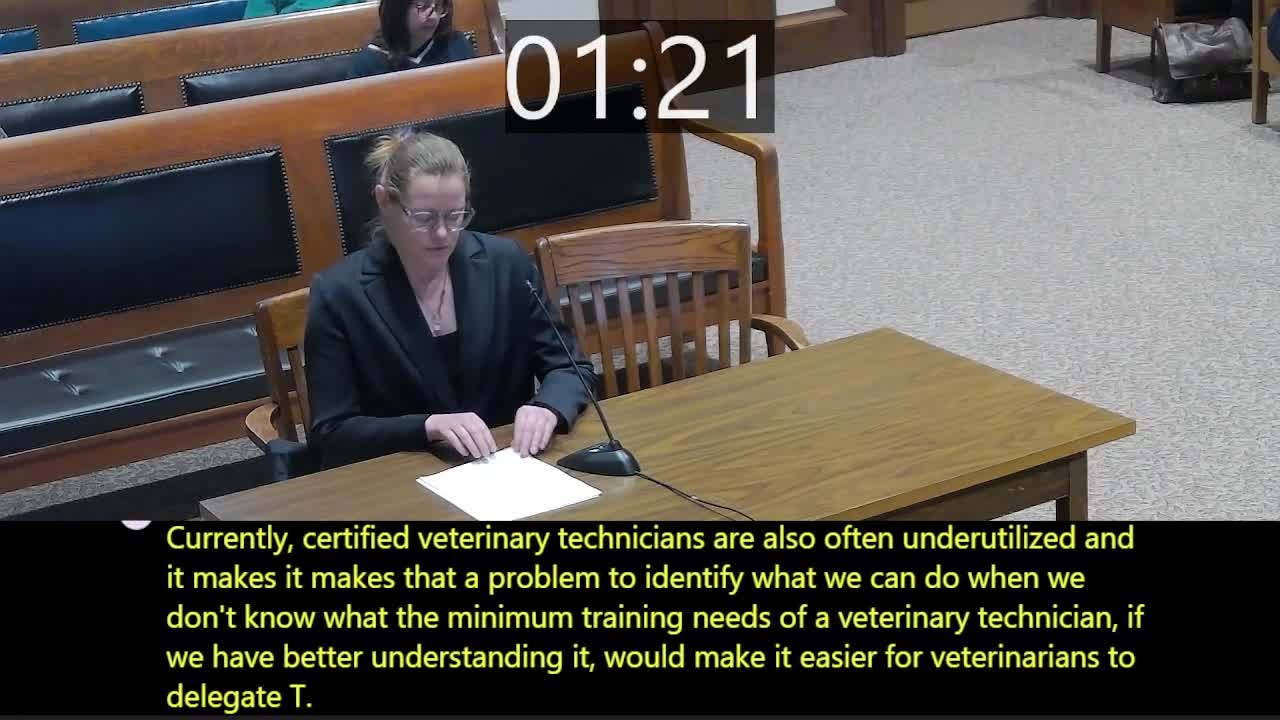Veterinary‑tech groups press for licensure to standardize training, reduce risks to patients
April 14, 2025 | 2025 Legislature MA, Massachusetts
This article was created by AI summarizing key points discussed. AI makes mistakes, so for full details and context, please refer to the video of the full meeting. Please report any errors so we can fix them. Report an error »

Representatives of the Massachusetts Veterinary Technician Association (MVTA) and certified veterinary technologists testified in support of House Bill 407 and Senate Bill 277 to establish licensure and a scope of practice for veterinary technicians in Massachusetts.
Amanda Cloutier, a credentialed veterinary technologist and MVTA president, described personal experience working as an uncredentialed on‑the‑job technician and said mistakes made without formal education can be life‑threatening. “These were not just minor errors. They were potential life, death mistakes,” Cloutier said, arguing that formal programs teach critical monitoring and medication‑dosing skills.
Anne Marie Moraviak, a certified veterinary technologist and educator, said Massachusetts currently allows individuals with varying levels of experience to be called veterinary technicians and that more than 40 other states have regulated licensure systems. She noted accredited programs include hundreds of hands‑on skills and a national exam assessing nine competency areas; MVTA members complete continuing education requirements for voluntary certification.
Witnesses said licensure would increase utilization of veterinary technicians, improve revenue and job satisfaction for practices, and reduce risk of disease transmission and clinical errors. Committee members asked about costs, scope-of-practice differences between veterinary assistants and technicians, and whether end‑of‑life measures would be within a licensed technician’s permitted tasks; witnesses said the bill establishes a scope of practice but did not provide final regulatory language in the hearing. No committee vote was taken at the session.
Amanda Cloutier, a credentialed veterinary technologist and MVTA president, described personal experience working as an uncredentialed on‑the‑job technician and said mistakes made without formal education can be life‑threatening. “These were not just minor errors. They were potential life, death mistakes,” Cloutier said, arguing that formal programs teach critical monitoring and medication‑dosing skills.
Anne Marie Moraviak, a certified veterinary technologist and educator, said Massachusetts currently allows individuals with varying levels of experience to be called veterinary technicians and that more than 40 other states have regulated licensure systems. She noted accredited programs include hundreds of hands‑on skills and a national exam assessing nine competency areas; MVTA members complete continuing education requirements for voluntary certification.
Witnesses said licensure would increase utilization of veterinary technicians, improve revenue and job satisfaction for practices, and reduce risk of disease transmission and clinical errors. Committee members asked about costs, scope-of-practice differences between veterinary assistants and technicians, and whether end‑of‑life measures would be within a licensed technician’s permitted tasks; witnesses said the bill establishes a scope of practice but did not provide final regulatory language in the hearing. No committee vote was taken at the session.
View full meeting
This article is based on a recent meeting—watch the full video and explore the complete transcript for deeper insights into the discussion.
View full meeting
